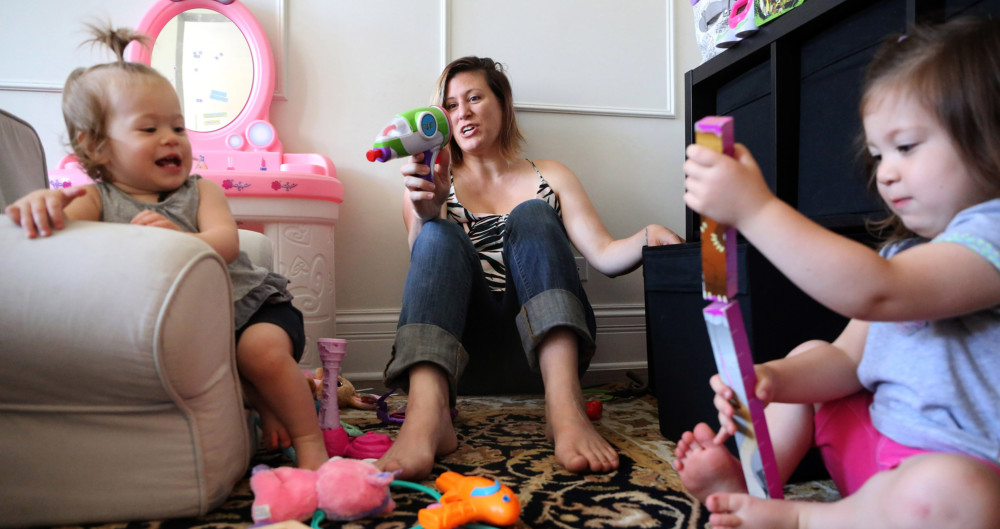By Danielle Braff
Chicago Tribune
WWR Article Summary (tl;dr) A recent Gallup survey found that stay-at-home moms in the United States are more likely than working moms to experience sadness and anger.
SOUTH BARRINGTON, Ill.
Trading in an overbearing boss, a killer commute and a gray cubicle to become a stay-at-home parent may seem as if you’ve won the lottery.
It felt that way for Jessica Spentzos, who had been a special education teacher for 12 years, had a 3-year-old son and was nine months pregnant with her second child.
After a 45-minute commute from her high-stress job, Spentzos had just minutes to play with her son and put him to bed before she did chores, prepped for the next day and fell asleep at 1 a.m.
So when she and her husband decided that she would stay home, the South Barrington woman was elated.
“It was like my golden ticket; my husband was my hero,” Spentzos said.
But it wasn’t too long before staying at home with two small children wasn’t as wonderful as she’d thought it would be.
“Things got real very fast,” she said. “I became their slave, and I became very isolated, and it became very lonely. I felt lost.”
She’s not the only one.
A recent Gallup survey found that stay-at-home moms in the United States are more likely than working moms to experience sadness and anger. Twenty-eight percent reported depression when asked how they were feeling the previous day, compared with 17 percent of the employed mothers. And 41 percent of the stay-at-home moms worry, compared with 34 percent of the working moms, the study found. Sixty-three percent of the employed mothers said they were thriving, compared with 55 percent of the moms who stay at home.
And while staying at home with your child is generally a choice that parents make willingly, psychologists said it’s difficult to predict how happy, or unhappy, this choice will make them prior to actually doing it, even if it seems like a good idea at the time.
“There are so many unexpected changes and stressors for new moms, it is difficult for anyone to predict how they will feel once they have the baby,” said Karen Kleiman, founder and director of The Postpartum Stress Center, and author of several books on postpartum depression. “Some women who expect to love being home, find they are bored and resentful. Others say they never imagined it would feel so good to be home.”
Either way, Kleiman said, most women who make the decision to stay home are surprised that staying home with their children can exacerbate the stress of having children. Even the joys of being with your children are offset by feelings of guilt and inadequacy, she said.
“Many women who feel competent in the workplace report that they unexpectedly doubt themselves as they navigate this uncharted territory,” Kleiman said.
There are ways to ease the transition, said Diana Lynn Barnes, a licensed psychotherapist with The Center for Postpartum Health in California.
Making a connection with other new mothers is essential, Barnes said.
“In this way, women begin to build a sense of community, which lessens feelings of isolation,” she said.
But some women never adjust.
Spentzos has been home with her children for 2 1/2 years, and she has volunteered at her son’s preschool and throughout her community. But she’s still not happy at home.
“The years went by, and every five minutes, I think about going back to work,” she said. “Most people would do anything to stay home, but I feel empty.”
For Lori Sapio, the answer was to give up the stay-at-home mom life … quickly.
Just 10 days after having her first child, the photographer felt as if she were going crazy, so she grabbed her camera and started booking shoots, despite her plans to surrender her career to stay home with her daughter.
And when her second daughter was born, Sapio lasted just five days of her planned three-month maternity leave before she returned to work.
“I’m obviously not the stay-at-home type of woman, and it’s OK,” she said.
Should you decide to stay at home though, Carly Snyder, a reproductive and perinatal psychiatrist in New York, said there isn’t a timeline on how long it should take you to adjust, but you should do what makes you happy.
“Barring financial reasons for returning to work, the choice should be based on whether a woman feels she will be happier working inside or outside the home, I don’t believe either option changes how good a mom someone is; it is just a question of how one wants to partition their time and their energy, and what will make them feel most accomplished and happiest at the end of the day,” Snyder said.
There’s no correct answer in parenting, she said.
One woman told her that she was a stay-at-home mom and her children were annoyed that she was always home. Her daughter worked, but her daughter’s children complained that their mother wasn’t home after school.
“There is no right answer, just the best answer for each mom and her family,” Snyder said.














































































































































































































































































































































































